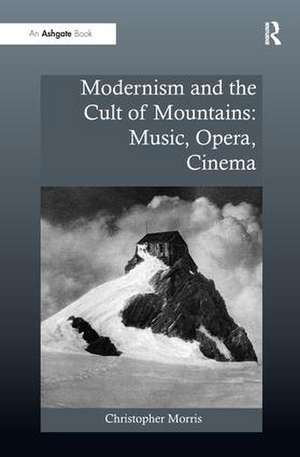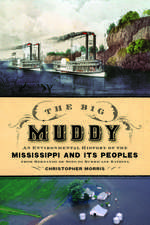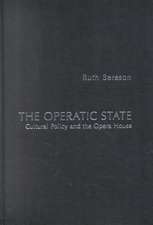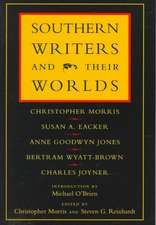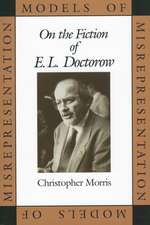Modernism and the Cult of Mountains: Music, Opera, Cinema: Ashgate Interdisciplinary Studies in Opera
Autor Christopher Morrisen Limba Engleză Paperback – 16 noi 2016
| Toate formatele și edițiile | Preț | Express |
|---|---|---|
| Paperback (1) | 436.14 lei 6-8 săpt. | |
| Taylor & Francis – 16 noi 2016 | 436.14 lei 6-8 săpt. | |
| Hardback (1) | 1058.65 lei 6-8 săpt. | |
| Taylor & Francis – 26 oct 2012 | 1058.65 lei 6-8 săpt. |
Din seria Ashgate Interdisciplinary Studies in Opera
-
 Preț: 388.53 lei
Preț: 388.53 lei -
 Preț: 389.66 lei
Preț: 389.66 lei - 18%
 Preț: 1001.07 lei
Preț: 1001.07 lei - 18%
 Preț: 1003.61 lei
Preț: 1003.61 lei -
 Preț: 436.14 lei
Preț: 436.14 lei -
 Preț: 489.26 lei
Preț: 489.26 lei - 18%
 Preț: 1004.20 lei
Preț: 1004.20 lei -
 Preț: 426.70 lei
Preț: 426.70 lei -
 Preț: 312.75 lei
Preț: 312.75 lei -
 Preț: 416.22 lei
Preț: 416.22 lei -
 Preț: 381.98 lei
Preț: 381.98 lei -
 Preț: 391.72 lei
Preț: 391.72 lei - 20%
 Preț: 259.98 lei
Preț: 259.98 lei -
 Preț: 384.27 lei
Preț: 384.27 lei -
 Preț: 469.34 lei
Preț: 469.34 lei -
 Preț: 449.41 lei
Preț: 449.41 lei - 13%
 Preț: 335.96 lei
Preț: 335.96 lei -
 Preț: 413.33 lei
Preț: 413.33 lei -
 Preț: 383.67 lei
Preț: 383.67 lei -
 Preț: 493.30 lei
Preț: 493.30 lei -
 Preț: 504.42 lei
Preț: 504.42 lei - 18%
 Preț: 1001.87 lei
Preț: 1001.87 lei -
 Preț: 489.26 lei
Preț: 489.26 lei -
 Preț: 469.17 lei
Preț: 469.17 lei - 16%
 Preț: 260.73 lei
Preț: 260.73 lei -
 Preț: 384.86 lei
Preț: 384.86 lei - 18%
 Preț: 1272.54 lei
Preț: 1272.54 lei - 18%
 Preț: 893.10 lei
Preț: 893.10 lei
Preț: 436.14 lei
Nou
Puncte Express: 654
Preț estimativ în valută:
83.45€ • 87.13$ • 69.07£
83.45€ • 87.13$ • 69.07£
Carte tipărită la comandă
Livrare economică 05-19 aprilie
Preluare comenzi: 021 569.72.76
Specificații
ISBN-13: 9781138279261
ISBN-10: 1138279269
Pagini: 220
Dimensiuni: 156 x 234 x 12 mm
Greutate: 0.45 kg
Ediția:1
Editura: Taylor & Francis
Colecția Routledge
Seria Ashgate Interdisciplinary Studies in Opera
Locul publicării:Oxford, United Kingdom
ISBN-10: 1138279269
Pagini: 220
Dimensiuni: 156 x 234 x 12 mm
Greutate: 0.45 kg
Ediția:1
Editura: Taylor & Francis
Colecția Routledge
Seria Ashgate Interdisciplinary Studies in Opera
Locul publicării:Oxford, United Kingdom
Notă biografică
Dr Christopher Morris is Lecturer in Music at University College Cork and teaches in the university's interdisciplinary programmes in film studies and digital arts. He has published widely on opera, new media and film music, including Reading Opera Between the Lines (2002). Current research projects include a critical analysis of opera on video and an investigation of contemporary staging practices in opera.
Recenzii
'Christopher Morris takes the cult of mountains as an unusual and fascinating point of view from which to consider anew some of the creative tensions at the core of German modernism, including such hotly debated themes as the place of the aesthetic in modernist thought and the role of music in early-twentieth-century German culture. This original and exciting book will interest not only musicologists, but also film scholars, cultural historians, and anyone interested in the relationship between art, culture and society.' Emanuele Senici, University of Rome La Sapienza, Italy 'With Modernism and the cult of mountains, Christopher Morris provides a most interesting contribution both to the lively field of opera studies and to the investigation of German modernism.' Die Theaterforschung
Cuprins
Introduction; Chapter 1 Across the Abyss: Tiefland on Stage; Chapter 2 Nature and Nostalgia: The Last Tone Poem; Chapter 3 Thoroughly Modern Mountains; Chapter 4 The Voice of the Glacier; Chapter 5 A Last Refuge: Tiefland on Screen; Chapter 6 Conclusion and Afterword;
Descriere
In this study opera serves as a nexus, shedding light on the circulation of ideas about politics, nature, technology, and aesthetics. Morris investigates operatic representations of the mountains in German modernism, showing how the liminal quality of the landscape forms the backdrop for opera's reflexive engagement with the identity and limits of its constituent media. This operatic reflexivity invites consideration of musical encounters with mountains in other genres, and Morris shows how these issues resonate in Strauss's Alpine Symphony and in the Bergfilm. By using music and the ideology of mountains to illuminate aspects of each other, Morris makes an original and valuable contribution to the critical study of modernism.
